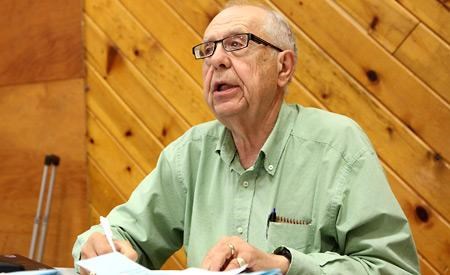Clint Williams has been re-elected for the fourth time as chief of Tla’amin (Sliammon) Nation and is looking forward to the transition to self-government.
Interviewed after his win on Saturday, September 13, he said he is very happy to be able to carry on with the great work of implementing the final agreement with BC and Canada. He also said Saturday’s vote was historic, being the last Indian Act election for the first nation.
“We are basically heading into a whole new world here, working at getting everything into place for the effective date of our treaty, which is scheduled for April 5, 2016,” Williams said.
Of the 446 votes cast for chief, Williams received 199. Gloria Francis had 180 votes and Vern Pielle received 65 votes.
There were 21 candidates for 10 available councillor seats. In the Tla’amin elections, candidates are able to run for both the position of chief and councillor. Although Francis was not elected as chief, she was elected as a councillor. The other councillors, in alphabetical order, are: Brian Hackett, John Hackett, Dillon Johnson, Eugene Louie, Larry Louie, Shawn Louie, Walter Paul, Sandy Point and Lori Sparrow.
Fred Schiffner, electoral officer, said there are always bumps in an election but the voting in Tla’amin went very smoothly. “We didn’t have any problems at all,” he said.
The vote separation between elected councillors and those who did not succeed in being elected was sufficient to not necessitate a recount. There was a nine-vote spread.
“You don’t want to see a tie, because if it comes down to a tie, I have to draw out of a hat,” Schiffner said. This is a peculiarity of the Indian Act and Schiffner has had to settle ties in this manner in other elections he’s done around the province. “It’s an electoral officer’s nightmare when that happens.”
Schiffner said he thought the turnout for this year’s Tla’amin election was “just incredible.”
In total, 473 Tla’amin members cast ballots. This is out of 809 eligible voters, for a 58-per-cent voter turnout. This compares favourably to the City of Powell River’s 43.6-per-cent tally in the 2011 civic election.
One of the difficulties in getting even greater turnout, Schiffner said, is the difficulty in reaching all of the voters. Under the Indian Act, there is only one polling station and it is situated on the reserve. There are no advance polls and anyone living off the first nation’s lands must vote by mail-in ballot. Schiffner said there are a lot of people for whom there are no addresses.
In moving forward from the election, Williams said right now, there is “just a ton of work happening in the background,” developing all of the laws and policies that will replace the Indian Act.
The Tla’amin leadership has been holding many community consultation sessions in an attempt to keep people updated with the progress that is happening and Williams expects that to continue. “It’s exciting times,” he said.
The first nation has three main working groups: one is specific to the finance area, another is specific to lands and resources and the third is specific to governance.
“I’ve tried to sit with each of the three working groups, trying to keep up to date on what is happening,” he said.
Williams said in the working group for governance, efforts have been made to develop the baseline minimum amount of laws required.
“They are all still in draft form,” he said. “We’ll need to go through some community consultation in collaboration with the other working groups.”
The deadline for the working groups to complete the assigned tasks in time for the treaty seems distant, but Williams said time is going by quickly.
“We just want to build a brighter future for the Sliammon people and create a platform where we can all succeed and prosper together.”
Williams said it is time to live up to all of the campaign slogans. “Now is the time because we are basically developing a whole new government that will govern our Tla’amin people,” he said.



